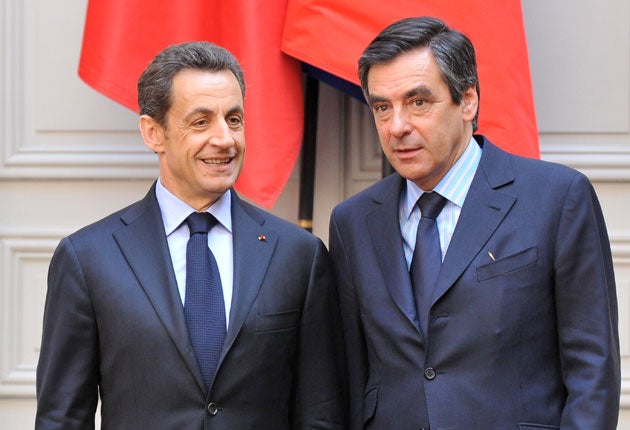Botched cabinet reshuffle gives Sarkozy's rivals new strength

President Nicolas Sarkozy last night announced a new government largely restricted to his own tribe of the centre-right, abandoning his policy of "ouverture" to the left, centre and racial minorities.
After eight months of shilly-shallying over a new French government, Mr Sarkozy shrank from firing the prime minister, Francois(cedilla on c) Fillon, but dismissed several prominent ministers who were plucked – to the anger of his own supporters - from the left and the centre and from immigrant backgrounds three years ago.
The high profile casualties included the foreign minister, Bernard Kouchner, the controversial but popular, Senegalese-born sports minister, Rama Yade, the centrist defence minister, Herve(acute on last e) Morin and the leftist urban affairs minister, Fadela Amara.
The centrist environment minister, Jean-Louis Borloo, who had been thought likely to succeed Mr Fillon, added to the holocaust by flouncing out of the government. He was offered senior positions, including foreign minister, but announced that he wanted to "reclaim his liberty" and promote his own "values...including social cohesiveness." This implied that Mr Borloo might run for President himself in 2012 and accuse Mr Sarkozy of taking a confrontational approach to pension reform and other social policies
Although intended to strengthen the unpopular Mr Sarkozy before the 2012 election, the reshuffle largely drew attention to the president's weakness. The outgoing cabinet had reflected Mr Sarkozy's original determination, in the euphoria of victory in 2007, to impose his own choices and favourites on government, defiying party hierarchies and tribal politics. The new government is mostly composed of the leading figures in his own ex-Gaullist wing of the ruling centre-right party, the Union pour un Mouvement Populaire.
Most of all, Mr Sarkozy has been forced to accept that Mr Fillon, 56 – popular with centrte right voters and parliamentarians – has become unsackable. Mr Fillon was, theatrically, asked to resign by President Sarkozy on Saturday night and then reinstated yesterday morning.
Just over a month ago, the prime minister had distanced himself from Mr Sarkozy's swing to the authoritarian Right and appeared destined for the chop. He may now become the first prime minister to serve through a whole presidential term since the creation of the Fifth Republic a half century ago.
The relationship between the two has often been strained. In the constitution of the Fifth Republic it is supposed to be the prime minister who becomes unpopular while the President remains aloof. By acting as his own prime minister, and often reducing Mr Fillon to a cipher, President Sarkozy reversed the pattern. His own poll ratings have collapsed, while the quieter, more concensual Mr Fillon has remained relatively popular.
Alain Juppe(acute on e), former prime minister under Jacques Chirac, returns to government as defence minister. Michele(grave on first e) Alliot-Marie, the justice minister who had fallen out of favour with the Elysee(acute on middle e) Palace, had been slated for dismissal. Mr Borloo's refusal to join the new team presented her with the plum job of foreign minister.
The highly-regarded Christine Lagarde remains as finance minister. Mr Sarkozy's childhood friend, Brice Hortefeux, stays as interior minister. The other great casualty of the night was Eric Woerth, the employment minister who pushed through the much-contested reform of the pensions system. He has also been at the centre of a scandal over alleged influence trading and illegal financing of Mr Sarkozy;s 2007 campaign. He has been quietly dropped and replaced by the UMP president, Xaviuer Bertrand.
Mr Borloo, the hirsute, centrist environment and energy minister, seemed certain to replace Mr Fillon only a fortnight ago. President Sarkozy ultimately succumbed to a whispering campaign within his own party – allegedly inspired by Mr Fillon himself – which portrayed Mr Borloo as a light-weight who was too fond of late nights.
In any case, the parliamentary troops of Mr Sarkozy's UMP had made it clear that they wanted Mr Fillon to stay.
The Elysee Palace said the new government would be leaner (31 full and junior ministers instead of 37) and "more professional". It would be a government of "combat" to continue President Sarkozy's programme of reforms, after the much contested changes in the pension system finally became law last week.
Despite the hiring of one or two replacement centrists, such as Michel Mercier as justice minister, opposition politicians and outgoing ministers accused Mr Sarkozy of creating a narrow and unbalanced government of the centre-right. Mr Morin, leader of a centrist party allied with Mr Sarkozy but fired last night as defence miunister, said the new government was a "campaign committee, based on the (old Gaullist party) the RPR."
Join our commenting forum
Join thought-provoking conversations, follow other Independent readers and see their replies
Comments